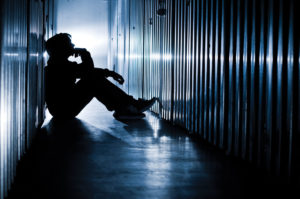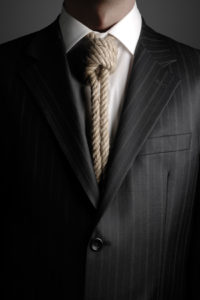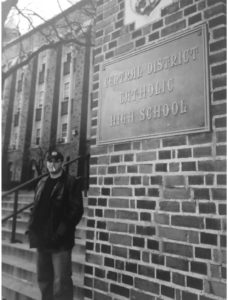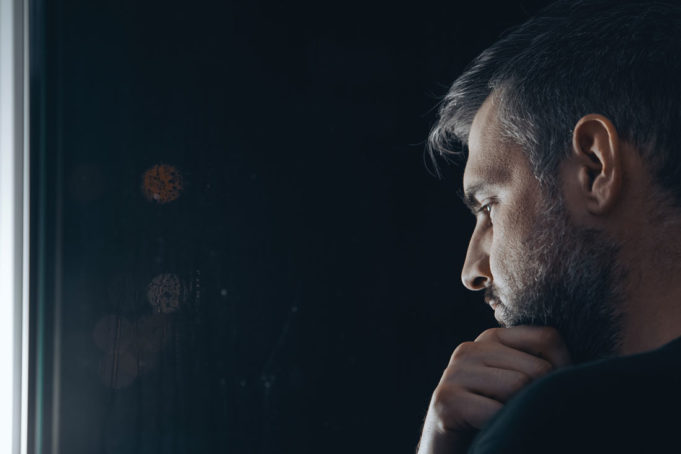I walk around all day now muttering to myself, “I’m sorry, Adam. I’m so sorry, Adam. I’m so very sorry.” Is there anything I could have said or done that would have stopped him, that would have helped him heal? I’ll never know. The last time my beloved older brother and I talked, it was a week or so before our niece’s wedding. This was by text. Adam said he was a little let down that my wife Dana wouldn’t be joining us. The two of them always got along well.
“I know it’s an expensive trip,” Adam wrote, “but it’d be nice to see you guys together.”
I said that Dana and I didn’t have two-grand lying around, the minimum cost for all three of us, including our 6-year-old son, to fly from our home in Fort Worth to the location of the wedding, Old Saybrook, Connecticut, on Labor Day weekend. Most of us Marianis would be there –– Adam, me, our older sister Virginia and her family, and the extended family of our older brother Lenny, the father of the bride –– except Mom. She’s too sick to travel from Pittsburgh, our hometown. She’s also 81 and has bad knees. Daddy died more than 20 years ago.
“I know,” Adam wrote back. “I also understand. You feel me?”
“Of course,” I replied. “I don’t envy you one second. Sorry you have to go through this. Can you take Xanax? For the drive?”
“I was talking about Dana not being able to join you, but thanks.”
“Yes,” I said. “Thanks, Adam.”
I didn’t know what he was talking about. Thanks, Adam? I’m still not quite sure what that means, though it must have made some kind of sense to me at the time. Thanks? Was he saying he wanted to see Dana and me one last time? Did my failure to “feel” him cost him his life?
And that’s the last conversation we had. The last one when he was alive. I texted him throughout the wedding like the coward that I am. “You would have hated today. No booze in the house – NERDS! – and an hour-long mass. At least we passed the two-hour lag between the ceremony and the reception by going to a pub. Everyone had A beer. I had three. NERDS! I miss you so much. I love you more than you’ll ever know. My best friend.”
Adam was not happy about the seven-hour drive from his apartment in Reston, Virginia. He was an alcoholic, a highly functioning one but still an addict, and while he could work eight hours plus overtime day to day without booze – he provided security detail for a foreign diplomat and his family in the D.C. area – he couldn’t go but a few hours dry on his days off. He was even less thrilled about doing one of the readings. Our brother always hated attention, and probably due to some sort of megalomania or narcissism plaguing him, he always felt everyone was watching him. In the car on the way to Lenny’s house from the Connecticut airport, Lenny and I hoped that maybe the thought of making that long drive on a holiday weekend pissed off our brother to the point where he simply let his phone die and stayed home. Adam loved to complain. That was part of his illness and even his charm. Traffic, messed-up dry cleaning, spilled soda – it could all send him into a tizzy. Lenny lovingly referred to our brother as a “yenta” (which, in Yiddish, actually means “a gossip,” but we’re Italian, so it’s close enough).
 Adam was supposed to check in on Thursday. It was Friday when I called the Reston police and asked them to go by his apartment. A detective called me back about two hours later with the news. Lenny, his wife Sue, and I were on the way to the rehearsal dinner. We were getting out of the car when my phone rang. We ended up crying in the dark parking lot, Lenny on the phone with our mom and me calling Dana. Len, Sue, and I skipped the dinner and went back to their house nearby, where I sat on the peaceful back porch in the chilly air looking out at the darkened Long Island Sound and the chaotic yet peaceful patterns of stars overhead. The only beer in the house was a couple bottles of some craft nonsense, including Guinness Stout, which tasted like cold chew spit. Adam would have been outraged by the lack of Bud Light, his and my drink of choice. I sat quietly by the sound, sipping, grimacing, sipping, trying not to bawl and trying not to think about all of the poor choices I had made. And that I continue making.
Adam was supposed to check in on Thursday. It was Friday when I called the Reston police and asked them to go by his apartment. A detective called me back about two hours later with the news. Lenny, his wife Sue, and I were on the way to the rehearsal dinner. We were getting out of the car when my phone rang. We ended up crying in the dark parking lot, Lenny on the phone with our mom and me calling Dana. Len, Sue, and I skipped the dinner and went back to their house nearby, where I sat on the peaceful back porch in the chilly air looking out at the darkened Long Island Sound and the chaotic yet peaceful patterns of stars overhead. The only beer in the house was a couple bottles of some craft nonsense, including Guinness Stout, which tasted like cold chew spit. Adam would have been outraged by the lack of Bud Light, his and my drink of choice. I sat quietly by the sound, sipping, grimacing, sipping, trying not to bawl and trying not to think about all of the poor choices I had made. And that I continue making.
There was hope that it was an accident, that our brother didn’t really mean to do it. The detective mentioned that Adam was taking a lot of medication. At 52, he wasn’t obese but wasn’t in the best shape, and he had psoriasis. And our father and his older brother, our Uncle Luigi, were also alcoholics. “Wouldn’t they have heard the gunshot?” Virginia asked Lenny and me hopefully. “Wouldn’t someone else in the apartment complex have called the police?” However, there was also the knowledge that Adam carried a firearm for work and that he was severely depressed.
I had always pictured him in his bedroom for some reason, even though I’d never visited him. Of course I never visited. I was a lousy brother who lived hundreds of miles away with his own family. I imagined his bedroom because in my bedroom at our childhood home of 309 Taylor Street in Pittsburgh is where I battled depression as a young man, before I sought and received help in my late 20s. I later pieced together that Adam was on his couch when he pulled the trigger. My sister, who was in contact with Adam’s only close friend in Virginia, had mentioned something about taking the piece of furniture to “the dump.” Fuck, I thought. The last thing that my sweet, loving older brother probably saw was a blank TV and a coffee table. A phrase from my college lit classes came back to me: “the banality of death.”
Like many of us, I believe, I’ve had suicidal thoughts. I even went as far as attaching a noose to the rear balcony railing of 309 Taylor. I stopped myself when I realized that the person who was going to find me dangling over the backyard was my dear old mother, the tender, strong woman who raised me and who was the only other soul living at 309 Taylor after her husband of 30-plus years, my father, died from cancer after a shockingly brief battle at the age of 61. That house was depressing in itself. Once so full of life, it was nothing but shadows after Daddy died and Lenny, Adam, and Virginia had moved out. Mummy and I tried our best. Virginia was still living in the area. On Wednesday nights, the three of us and later Virg’s young son would eat takeout Chinese together. The other highlight of my week was watching Frasier on Tuesday nights at 9:30. I wished I had a problem as cool, in the popular counter-culture sense, as alcoholism – instead of crushing depression – and I now often regret having made that wish. For my brother’s sake. Though I imbibe, I’m not too worried about my intake because I know my situation is only temporary. It started a year or two ago, when my son entered the public school system, and it will end once Apollo can get through a week of first grade without landing in the principal’s office. (A week? How about three days.) Dana and I can’t afford private school. Our dear Apollo is a kind, sweet boy, and he doesn’t know why he’s acting the way he is. That’s mostly because he was abandoned to an orphanage in West Africa as an infant. He had to scream for hours to have his dirty diaper changed or to be fed. Because of that, his default setting is darkness. Dana and I are doing everything we can to change his DNA to include a nurturing brightness. It’s our unspoken mission in life.
My depression often took the form of anger and sometimes violent self-loathing. I didn’t realize that as I beat myself up after Daddy died, I was also destroying my mother. The pain reached its peak one winter Saturday afternoon when I missed the bus to Carnegie Library, where I would transcribe help wanted ads from newspapers all over the country – I had just graduated college with a BA in English Literature, and what are you going to do with a BA in English Lit (and a laughably low grade-point average). I wasn’t just unemployed at the time. I was painfully unemployed. My only responsibilities were driving my mom to and from work downtown Monday through Friday and watching Live with Regis and Kathie Lee at 9 every weekday morning. After I missed the bus that Saturday, I stormed back to 309 Taylor and began punching the door of my attic bedroom. I knocked it off its hinges. My mom clambered up the stairs and, seeing the destruction and the look of utter rage on my face, broke down. “I don’t know what to do. I don’t know what to do. I don’t know what to do.” She kept repeating this while sobbing uncontrollably on my bedroom floor in a heap. I was always content to hurt myself or my environment but never anyone else. Seeing the pain that I was putting my mother through instantly triggered a startling clarity in me. I calmed down after that. I had to have. A few months later, I left 309 Taylor for good. I was hired at a newspaper in Houston, Texas, where I would soon meet my future wife. The job was from one of the classified ads that I had transcribed. This is a grace that I guarantee you I will never feel worthy of accepting.
*****
Since depression is mostly a chemical imbalance, it can be exacerbated by too much drink or too many drugs or both. It can also be worsened by a major life change, and for my brother, that was a divorce. He and Monique had been married for a few years but never seemed to progress beyond the boyfriend/girlfriend stage. They may or may not have tried to have a family, but, in any case, they didn’t have one, which I know had to hurt, even if only a little. Adam did not seem too troubled. By that or anything, really. All he wanted to do was what he wanted to do, what he –– as a lifelong worker bee who had put in long hours for years and demeaned himself regularly in the past for the sake of a steady paycheck –– felt entitled to do, and on off days during football season, that amounted to drinking beer and following his assorted fantasy teams. The rest of the year, it was drink beer. Compromise was not part of his love language. As many childless couples tend to focus on travel, Adam couldn’t stand to be away from alcohol (or nicotine) any longer than, really, a few hours, which meant that flying, and long drives, were out of the question. Slowly but with increasing intensity, life by the drop became my brother’s existence: experiencing or anticipating (or, because he was gainfully employed, sobering up from) his next buzz.
 That’s no way to live, because once that becomes your everything, then you have nothing.
That’s no way to live, because once that becomes your everything, then you have nothing.
We tried to help. Lenny, a big wig with a major insurance carrier, offered Adam a job in Hartford. Lenny only recently told me that the money wasn’t right for our brother, according to our brother. The three of us texted constantly about sports, about the Penguins, the Steelers, and even our old high school, Central Catholic. Our conversations always ended the same, with Adam eventually raging at Lenny and me for making his phone keep fucking dinging. We other Marianis always invited Adam to our houses and to other family functions. He made most of the trips but only after downing three beers in rapid succession before getting behind the wheel. And that was it for him. Beer. Not whiskey, not vodka, not anything else. Just a few beers to keep him going. Other family members may have experienced otherwise, but I never saw him drunk. He was way too self-conscious to make a fool of himself, especially in front of his little bro, whom he truly adored. I never felt like anything less than No. 1 with him. This is indisputable.
Adam didn’t seem to want help. I think he thought it would have cost him his security job. We told him there are laws in place to protect workers from discrimination for seeking psychological help. We told him that if he were terminated, he could probably sue his company. It didn’t matter. I think he wanted to prove a point. Having contemplated suicide myself, I always thought that leaving a message (different from a note) was a large component of the act. Telling someone or something to fuck off. Telling someone or something that I’m going to hurt you worse than you ever could have imagined hurting me. Knowing Adam, he was sending a message to our deceased father, who, like most men of his post-WWII generation, was a paradox. As loving and tender as our dad was, he could also be a son of a bitch. All of his career failures, and they were many, appeared to take the shape of Adam. This was after Daddy’s interior drywall company had gone under, sunk by a series of bad investments he made over the years, relegating the once proud, once thriving Leonardo Mariani to the edge of the living room couch at 309 Taylor in front of cans of Iron City, a pack of Luckys, and countless hours of horrible daytime TV. Adam and I were working our ways through college at the time. I was doing construction in the summers while Adam worked full-time at the men’s shoe store up the street. Unlike my seasonal work, Adam’s job was year-round, with a full course-load at Duquesne University, where he was the starting right tackle for a couple years before being able to pay for, stay in, and finish college became more important than football. I knew quitting the sport he loved so much had to hurt. I never acknowledged it, though. I just kept trying to stay out of the way of my dad and Adam, who were at each other’s throats most of the time. The abuse was not physical – Adam dwarfed our father. Like most abuse, however, it had started physically, decades ago. Adam was a little pigeon-toed as a kid, and walking along the boardwalk in Wildwood one summer family vacation in the 1970s – Adam must have been around 10 – he felt a swift kick in his rear. It was Daddy. “Walk straight,” Leonardo snarled at him. Adam always swore he could still feel that kick.
Daddy mostly went out of his way to embarrass my brother, calling him rude names in public, saying stupid things on purpose around his friends. It wasn’t until later in life that Adam realized the extent of Daddy’s abusiveness toward him. As our father lay on his deathbed, his eyes nearly sealed shut with Vaseline, the rest of us took turns saying our goodbyes. Daddy opened his eyes for all of us except Adam. “Hey, Pa,” Adam had said. “It’s jagasso,” referencing a pejorative that Daddy frequently hurled at him, an Italian mangling of “jackass” and the uniquely Pittsburgh term of endearment “jagoff.” The abuse was so bad but Adam so blind to it that when Adam suggested getting a tattoo on his shoulder of a young Daddy’s face, we siblings and Mummy sort of embarrassedly talked him out of it. What we wanted to say but didn’t was “Daddy was an asshole to you. Why would you want a tattoo of him, of all people?”
I think it’s because my father was traditionally handsome and Adam always prized his own good looks and appearance. I always kidded my brother that he would take a shower and put on a bespoke suit just to go to Kroger. Growing old and losing status in the looks-obsessed culture that is America had to weigh on him, too. Suicide among middle-aged white males has never been higher and has skyrocketed over the past couple of years alone. A psychology professor at Colorado State University writes that older white men “may be less psychologically equipped [than any other group] to deal with the normal challenges of aging, likely because of their privilege up until late adulthood.” In 2015, the foundation says, white males accounted for seven of every 10 suicides in the country. Apparently, being born on third base isn’t as easy as it may seem.
*****
Life is beautiful. It’s the greatest adventure of all. Full of highs and lows, it’s one helluva ride, and living it, especially in this day and age, with all of our advancements in medicine and technology, is the greatest privilege in the universe.
Depression doesn’t care about any of that. Depression makes everything unbearable. The other day my wife quoted one of her favorite bands, the Indigo Girls: “Darkness has a hunger that’s insatiable / And lightness has a call that’s hard to hear.” And it’s true. The darkness just wants to blanket all of you in shadow to the point where you can’t even see the light anymore. I can’t help but believe that we’re all just a couple of bad breaks away from disaster. I can see how someone living miles away from home with no one really to turn to for comfort could give in to the blackness. After I loosened the noose from my neck, I dragged myself through the next few minutes, and then the next few hours, and then the next few days, because that’s basically what you’re doing: dragging yourself through life, when even the thought of getting out of bed and putting your shoes on seems insurmountable. I once told Adam that killing yourself is a permanent solution to a temporary problem, because when looked at from 35,000 feet, life is temporary. We’re here maybe 85 years tops. The earth is 4.5 billion years old. It’s still going to be spinning whether it’s beneath our feet or not, and the sooner we realize that, the more quickly we can begin healing, the more readily we can begin shrugging off the bad breaks and the rough patches, the sooner we can get back to enjoying the ride.
Adam just wanted off. He had had enough. Adam just wanted the ride to stop.
When the police told me that my best friend had died, it didn’t hit me immediately. It wasn’t until a few minutes later when I called my wife that I felt I could let myself mourn. Now all I do is cry. And rage against him. I do a lot of that, too. The other day while walking from my office to my car to drive home to my completely imperfect but perfect for me family, I was dazzled by a beautiful sunset, lots of purples and pinks mixed with orange and yellow across bulbous, fluffy clouds, and I thought, I can’t believe my brother turned his back on all this. I can’t believe he got off the ride. But depression is a monster. It is worse than death, far worse than being under ground or turned into ashes. It is the death of hope. Why didn’t he call me?
Everyone keeps telling me not to blame myself, that there was nothing I could have said or done to have changed a thing. But why? Why can’t I blame myself if that’s going to make me a better person, a better son to my mother and a better brother to my sister and other brother? And, perhaps most importantly of all, a better husband to my wife and father to my son? I was a lazy brother to Adam. There is no doubt about that. That is a fact. I could have called him more often. I texted him a bunch but rarely ever called. And I knew. I knew he was not doing well. Our mom exploded a couple of years ago when I chose to spend my vacation with my friends instead of with Adam. What’s the big deal? I whined. I even solicited Adam’s blessing while I was living it up with my buds. Ever humble and ever supportive of his little bro, he wrote off Mummy’s angst toward my vacation as her simply being her usual neurotic self. At least that’s what he told me. He was a good brother that way.
Adam was a great brother, actually. It wasn’t just his love and affection. Adam was secretly brilliant, “secretly” because, while he had decent grades, he wasn’t necessarily known for his book smarts. My matter-of-factness, which helps me every day, comes from him. When we were younger, while people were fighting over Option A or Option B – and I was often one of the combatants – Adam had already moved on to Option C, and it was almost always the best, most levelheaded path.

This is something I told him one night when he texted me that he had his gun to his head. It was during a Penguins playoff game while we three brothers were sitting around our respective TVs in three different parts of the country texting one another excitedly about all of the action. “87 is a BEAST.” “I got a man-crush on Justin Schultz!” “Ducking Murray letting in another softy.” At one point, as usual, Adam retreated from the conversation. A few minutes later, he texted me only and told me his situation. I ran out into the garage for some privacy and called him immediately. I intended to offer him comfort and support and also let him know that, yeah, I’ve been there, but a permanent solution to a temporary problem is not the answer. Adam said his problems are permanent. I told him he matters too much to me and my family to deprive us of his presence and his love, because no matter what, Adam had to know he was loved. We four siblings and our mother were always kind and caring with one another. I also told Adam that without him and his particular brand of insight I would not be half the man I am today and that even though he is hundreds of miles away he helps guide me through my daily life. He seemed appreciative. Our talk turned to our happy memories of growing up together. Still some of the best moments in my life are the quiet summer nights that he and I spent together in our attic bedroom – he must have been 12-ish and me around 7 –– lying on our beds, listening to Silk Degrees or the Saturday Night Fever soundtrack, and drawing pro wrestlers from Adam’s beloved pro wrestling mags. We still always laughed about “Lockjaw Graham.” It was my drawing of “Superstar” Billy Graham with an unintentionally elongated chin. “Lockjaw Graham” is what Adam called it, always followed by a guffaw. All these years later, “Lockjaw Graham” was never not funny. Hanging up the phone, wiping my eyes from laughing so hard, I thought my brother and I had come to a real breakthrough. I felt Adam reached out because he simply needed to know how much and in what manner he was loved by not only me but also everyone whose life he touched. And, well, mission accomplished.
That was one of the last times we spoke over the phone. That was nearly a year ago.
Over the past few months, as his texts grew increasingly bitter, I always had every intention of calling him. I would walk around entire days sometimes thinking, I need to make some time to call Adam. I need to be able to create some privacy to be able to speak with him. The one thing that always made me balk was the anticipation of another phone call from my son’s school. I still walk around all day with a hole in my stomach waiting, just waiting, for the principal or Apollo’s teacher to call me and tell me about all the havoc this 6-year-old is creating in the classroom and on the playground. Now I will be spending the rest of my life walking around trying to find time and space to call my loving older brother but coming up short, always coming up short. All of our tomorrows are gone. I won’t write him a letter, either. That would just seem beyond cowardly at this point. I’ve learned my lesson. As I’ve told most of our friends who have called/texted me in the aftermath of Adam’s death, “Call your family now and tell them how much they mean to you. You might not get another chance.” Waiting is the difference between manifesting a wretched species of despair that I wouldn’t wish on anyone and, my guess, being able to sleep at night for the rest of your life. I, for one, will never know.
The detective working the case believes Adam may have taken his life on the Thursday before Labor Day weekend. That’s when I had the dream. You can ask my wife. I told her Friday morning about it, a good half day before I would learn the horrible news. Though asleep in Fort Worth, I was dreaming about trying to fall asleep in my old bed at 309 Taylor – I slept on one side of the attic while Adam slept in the other room on the other side while we were both in college. Lying in the dark, I was listening to my phone or a radio. The Byrds’ “Turn! Turn! Turn!” was on super-low volume, but it sounded very crisp. A presence entered through the closed door. “Adam” was my first thought. It has to be my brother. I tried to talk, because I couldn’t see – it could have been someone else, my dad possibly, a stranger – but nothing would come out of my mouth, only whimpers. Then gentle hands reached down and caressed my face. Though I was petrified, I grabbed them and held them there, on my cheeks. I just held them, desperately scanning the darkness for a face and trying to call out. Adam! I was moaning. Adam, what’s up?! I will forever believe that the hands belonged to my brother. For the sake of my soul, because, based on my track record, that’s all I really care about, anyway: me. I’m so sorry, Adam. I thought we had more time. We still have so much to talk about.













Thank you for sharing this well-written, heart-felt piece on your brother’s sad death. Depression is a common mental health ailment that isn’t discussed enough. You were brave to share your own struggle with this problem. Your brother Adam sounded like a good soul in need of much support. I offer you and your family my condolences.
Thank you, Richard. Kind words really do help. Thanks again.
I cannot imagine your pain
All I can say is I am very sorry for you and your families pain.maybe just maybe our Lord God will bring you some comfort.I will pray for you and your family and maybe just maybe it will help
The holidays just seem to enhance the pain anger and loneliness.
I
I was deeply touched by your story of the loss of your brother. We all make choices that we regret in retrospect, and sometimes there is no way forward except to do as you have done here, sharing your story in hope of helping others. Thank you for doing so.
Thank you, Wesley and Sharon. It means a lot to me that you took the time to reach out. Thanks.
Anthony, this is such a powerful use of words. It took a lot of courage to write this, facing the pain and the regret and choosing to share. I pray your words help in your healing, and helps others who are struggling with depression, or know someone suffering. You are right. Depression is a monster.
Thank you, Melanie. I appreciate your prayers and thoughts.
Thank you.
How lovely that he was able to reach into your conscious and say his goodbyes.
Anthony, your brother will always be there for you. I don’t know how or why I was sent to this page. Maybe it was a gift from you and Adam. I knew Adam when I was a young girl around 13. He was good and beautiful boy. I am so very sorry to hear about Adam and for your family. Please know your story has touched me in very deep way. I am going to see and hug my brother and tell him that I love him. I pray and hope that you have found peace. Thank you.